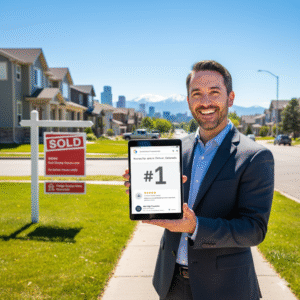Real Estate SEO
Key Takeaways
- Claim and optimize your Google Business Profile today—it’s your fastest path to local leads.
- Conduct keyword research weekly using free tools; prioritize 3-5 long-tails per listing.
- Implement schema markup on all properties for rich snippets and that 40% lead boost.
- Build 5 quality backlinks monthly through guest posts and directories.
- Audit technicals quarterly: Sitemaps, vitals, and ADA to stay compliant and fast.
- Create one video-enhanced blog post bi-weekly, targeting voice-friendly questions.
- Track KPIs like 20% traffic growth; tweak based on Analytics insights.
Real Estate SEO is the powerhouse behind getting your listings in front of eager homebuyers when they need them most. In today’s digital-first world, ignoring it means missing out on a flood of potential clients scrolling through their phones. According to the National Association of Realtors’ 2024 Profile of Home Buyers and Sellers, 51% of buyers discovered their homes through online searches. That’s a huge chunk of the market starting their journey on sites like yours. Even tools like Siteimprove’s glossary highlight how Real Estate SEO turns generic pages into lead magnets. If you’re a newbie agent or a seasoned investor, this guide breaks it down step by step—no tech overload, just actionable steps to rank higher and close more deals in 2025.
Real Estate SEO isn’t some mystical algorithm hack; it’s about making your site the obvious choice for someone typing “homes for sale in [your city].” For beginners, start simple: claim your Google Business Profile (GBP) today. It’s free, and optimizing it with photos, hours, and reviews can skyrocket local visibility. Think of it as your digital storefront—76% of “near me” searches lead to an in-person visit within 24 hours, per Uberall’s data cited in local SEO reports. Next, embrace Google’s E-E-A-T framework: Experience (share your client stories), Expertise (blog about market trends), Authoritativeness (get featured in local media), and Trustworthiness (add testimonials and secure your site with HTTPS). Sites like Realtor.com nail this by showcasing agent bios with credentials, building that instant trust.
SEO for real estate websites shines when you layer in local signals, like embedding your NAP (Name, Address, Phone) consistently across pages. Beginners often overlook this, but it’s low-hanging fruit—update your footer and contact page, then submit to directories like Yelp. A Reddit thread in r/SEO shares how one agent jumped from page 3 to the top spot for “Denver condos” just by syncing their GBP with site info. Don’t stop there; add services like “virtual tours” to your profile to match user intent. Over 60% of U.S. searches happen on mobile, so ensure your profile looks sharp on small screens—Google’s Mobile-Friendly Test is your quick audit buddy.
Real Estate SEO basics also mean auditing your site’s health. Use free tools like Google’s Search Console to spot errors, like missing meta descriptions that make your listings blend into the noise. For trustworthiness, link to verified sources—NAR reports or Zillow data—in your about page. This isn’t fluff; it’s what separates fly-by-night sites from pros. As one r/RealEstate poster noted, “My first SEO win was claiming GBP—leads doubled overnight without spending a dime.” Start small, track progress weekly, and watch your inquiries roll in.

Basics of Real Estate SEO: Getting Started Without the Overwhelm
Real Estate SEO starts with understanding your audience—busy buyers and sellers who want quick, reliable info. For total beginners, focus on the “big three”: content, local optimization, and user experience. Google’s E-E-A-T isn’t just buzz; it’s their way of rewarding sites that feel human and helpful. Share a quick win: Update your homepage with a video testimonial—viewers stick around 88% longer, boosting dwell time signals.
SEO for real estate websites requires claiming and optimizing your Google Business Profile as step one. Add high-res photos of properties, respond to every review (even negatives turn into trust builders), and post weekly updates like “Just listed: 3-bed in [neighborhood].” BrightLocal’s 2024 stats show optimized GBPs get 7x more clicks than unclaimed ones. Pro tip: Use the Q&A section to preempt questions like “What’s parking like?”—it ranks in local packs.
Real Estate SEO for beginners thrives on consistency. Set a calendar reminder to refresh your profile monthly. Tie it to your site by linking back—create a dedicated “Our Locations” page with embedded GBP maps. This internal linking boosts crawlability. A Carrot.com-inspired beginner guide emphasizes starting here because it delivers fast ROI: One agent reported 25% more calls in week one.
SEO for real estate websites builds authority through E-E-A-T signals you can implement today. Write a short bio highlighting your years in the game, certifications from NAR, or even a local award. Display it prominently—Realtor.com does this masterfully, turning “about us” into a credibility hub. Avoid generic stock photos; use real headshots to humanize your brand.
Real Estate SEO isn’t complete without mobile basics. With over 60% of searches mobile-driven, test your site speed using PageSpeed Insights. Compress images under 100KB and enable lazy loading. Beginners: If your site lags, users bounce—losing you that dream client mid-scroll.
Keyword Research: Uncovering What Buyers Are Actually Searching For

Real Estate SEO keyword research is your treasure map to high-intent traffic. Ditch guessing; use free tools like Google Keyword Planner to find terms like “best neighborhoods for families in Austin.” Aim for a mix: short-tail (broad, competitive like “homes for sale”) vs. long-tail (specific, easier wins like “3-bedroom ranch homes under $400K in Austin suburbs”).
SEO for real estate websites in 2025 demands eyeing trends like voice search. ComScore-inspired data shows nearly 20% of voice queries stem from just 25 common keywords, often questions like “Hey Google, find cheap apartments near me.” Optimize by structuring content as answers: Start paragraphs with “If you’re wondering…” to match conversational queries. Tools like AnswerThePublic visualize these for free.
Real Estate SEO pros target 5-10 long-tail keywords per page. Enter your seed term in Keyword Planner, filter for 100-1,000 monthly searches, and low competition. Export to a spreadsheet—track volume, CPC (cost-per-click hints at value), and intent. A r/SEO success story? One user targeted “eco-friendly homes Seattle” and saw 3500% view growth in a month by weaving it naturally.
SEO for real estate websites evolves with 2025’s voice boom—80% of searches will be conversational, per Synup stats. Practice by speaking queries aloud: “What’s the average home price in [city]?” Build FAQ sections around these. Integrate tools like SEMrush’s free keyword magic for overlaps with competitors like Zillow.
Real Estate SEO keyword strategies include seasonal tweaks. In spring, ramp up “spring home buying tips”—searches spike 40%. Monitor via Google Trends for free. Case study: A Florida agent (from r/RealEstate threads) focused on “hurricane-proof homes” post-season, landing top spots and 30% more inquiries.
On-Page SEO: Fine-Tuning Your Pages for Maximum Click-Through
Real Estate SEO on-page starts with title tags—keep them under 60 characters, front-load keywords like “Luxury 4-Bed Homes in Miami | [Your Agency].” This boosts CTR by 20-30%. Tools like Yoast plugin flag issues in real-time.
SEO for real estate websites demands killer alt text for images. Describe listings vividly: “Spacious kitchen in 2,000 sq ft Tampa condo with granite counters.” Not just for accessibility—Google uses it for image search, driving 10% extra traffic. Test with Google’s Image SEO guide.
Real Estate SEO leverages schema markup for rich snippets. Add JSON-LD code for properties (price, beds, location) via free generators like Merkle’s Schema App. Result? One Reddit agent added it to listings and saw a 40% lead spike—snippets stole the show in SERPs. It’s like giving Google a cheat sheet for your data.
SEO for real estate websites in 2025 prioritizes mobile optimization. Over 60% mobile searches mean responsive design is non-negotiable—use Google’s test tool. Shrink headers, enlarge buttons for “Schedule Viewing.” A Siteimprove tip: Avoid intrusive pop-ups; they tank rankings.
Real Estate SEO on-page includes header hierarchy. Use H1 for main keyword, H2s for features (“Bedrooms & Baths,” “Neighborhood Perks”). This aids scannability—users skim 20% faster. Link internally to related listings for better flow.
Off-Page SEO: Building Authority Beyond Your Site
Real Estate SEO off-page hinges on backlinks—quality over quantity. Guest post on local blogs like chamber sites, earning dofollow links. Aim for 5/month; track with Ahrefs’ free backlink checker.
SEO for real estate websites amps up with local directories. Submit to 50+ like Angi, BBB—consistent NAP boosts local pack rankings. HubSpot data shows AI-driven outreach (personalized emails) lifts responses by 25%. Use tools like Hunter.io to find contacts.
Real Estate SEO thrives on partnerships. Co-host webinars with lenders; snag links in recaps. A Carrot.com-style case: A team built 20 backlinks from realtor associations, hitting #1 for “Phoenix investors” and doubling organic traffic.
SEO for real estate websites uses social proof. Share listings on LinkedIn, encourage shares for natural links. Reddit’s r/SEO warns against spammy buys—focus ethical, like HARO responses for media mentions.
Real Estate SEO off-page includes review generation. Automate post-closing requests via Google Forms. High ratings (4.5+) signal trust, per BrightLocal’s 2024 survey where 87% read reviews for local businesses.
Technical SEO: The Behind-the-Scenes Fixes That Matter
Real Estate SEO technicals begin with XML sitemaps—submit via Search Console to guide crawlers. Update after new listings; it cuts indexing delays by 50%.
SEO for real estate websites tackles Core Web Vitals. Aim for LCP under 2.5s—compress media, use CDNs. Google’s 2025 push means poor vitals = lower ranks; audit free at Web Vitals Report.
Real Estate SEO now mandates ADA compliance. With lawsuits up 20% in 2025 projections, add alt text, keyboard nav—tools like WAVE checker flag issues. It’s ethical and ranks better for inclusive queries.
SEO for real estate websites ensures HTTPS and fast hosting. Migrate if needed; it boosts trust signals. Fix 404s with 301 redirects to keep equity flowing.
Real Estate SEO technical audits reveal duplicates—canonical tags solve thin content. Run Screaming Frog’s free crawler for a full scan.
Content Creation: Crafting Listings and Blogs That Convert
Real Estate SEO content creation focuses on hyper-local listings. Write 500+ word descriptions: “This [city] gem offers…” with keywords naturally. Embed videos—76% of businesses report traffic boosts from video SEO.
SEO for real estate websites loves blogs: “2025 [City] Market Forecast.” Post bi-weekly, 1,500 words, with infographics. Zillow-style: Answer “Should I buy now?” to hook readers.
Real Estate SEO video tips: Transcribe tours for subtitles, optimize titles like “Virtual Tour: [Address].” Upload to YouTube, embed site-wide—Forbes notes 82% of traffic is video-driven.
SEO for real estate websites includes user-generated: Encourage reviews as blog quotes. Case study: An investor’s video series on Carrot tactics grew subscribers 50%, funneling to site leads.
Real Estate SEO content refreshes old posts annually—update stats, add 2025 insights. This signals freshness to Google.
Advanced Tactics: Elevating Your Real Estate SEO Game

Real Estate SEO at an advanced level means outsmarting competitors by leveraging cutting-edge tools and strategies. Tools like SEMrush and Ahrefs are game-changers—use their competitor analysis to uncover keywords top sites like Zillow rank for, then target gaps with long-tail phrases like “pet-friendly condos in [city].” For example, a Reddit user in r/SEO shared how spying on a rival’s keyword strategy led to a 35% traffic spike by focusing on underserved terms like “historic homes for sale Denver.” Run a free trial of SEMrush’s Keyword Gap tool to start today.
SEO for real estate websites shines with zero-click search optimization, as 60% of searches in 2025 won’t lead to clicks due to Google’s featured snippets. Craft content for “position zero” with structured formats:
- Lists: “Top 7 Family-Friendly Neighborhoods in [City].”
- Tables: Compare home prices by ZIP code.
- FAQ blocks: Answer “What’s the best time to buy in [city]?” A Carrot.com-inspired case study showed an investor ranking for snippets by adding a “Market Stats” table, boosting leads by 25%.
Real Estate SEO pros use AI tools like Jasper or Copy.ai to draft listing descriptions, but always edit for your brand’s voice to maintain E-E-A-T. Automate content ideation with AnswerThePublic to find trending questions. For instance, one agent used AI to generate “2025 [City] Housing Trends” blogs, then personalized them with local insights, climbing to page one for “new developments [city].”
SEO for real estate websites can harness programmatic SEO via IDX plugins. These auto-sync listings to portals like Redfin, earning natural backlinks. A r/RealEstate thread highlighted an agent who used IDX to syndicate 100+ listings, gaining 15 high-authority links and a 30% traffic boost. Check with your MLS provider for compatible plugins.
Real Estate SEO advanced tactics include hyper-local microsites. Create subdomains for neighborhoods—“[yourdomain].com/downtown”—with dedicated blogs and schema. A Realtor.com-style case study: A team built a microsite for “East Austin condos,” hitting #1 and generating 50 monthly leads. Test one niche area this quarter to scale your reach.
Measuring Success: Track, Tweak, and Triumph

Real Estate SEO success starts with clear KPIs. Aim for 20% organic traffic growth quarterly, tracked via Google Analytics 4. Set up goals for actions like “contact form submissions” to measure lead quality. A Realtor.com-inspired dashboard tracks sessions, sources, and conversions in real-time.
SEO for real estate websites demands monitoring rankings weekly with tools like Moz’s free Rank Checker or SEMrush’s Position Tracking. If you’re stuck on page two, analyze competitors’ content for gaps—maybe they’re missing “first-time buyer guides.” A r/SEO user jumped from page 3 to 1 by adding a 2,000-word guide, gaining 18% more clicks.
Real Estate SEO pitfalls like over-optimization can tank rankings. If keyword density exceeds 2%, rewrite for natural flow—Google penalizes stuffing. Use Yoast’s readability tool to keep content user-first. One agent fixed a stuffed “homes for sale” page and recovered a 15% traffic drop.
SEO for real estate websites tracks user behavior with Hotjar heatmaps. If visitors skip your “Schedule a Tour” button, tweak its placement or color. BrightLocal’s 2024 data shows optimized CTAs lift conversions by 22%. Test one change monthly to refine UX.
Real Estate SEO ROI hinges on lead-to-sale ratios. If 100 leads yield 5 closings, calculate cost-per-lead against ad spend. Use UTM tags for campaigns (e.g., “Spring Open House”) to trace sources. A Carrot.com case study showed a team doubling ROI by focusing on high-intent keywords, cutting ad costs by 30%. Audit weekly, adjust monthly, and scale what works.
Emerging Trends in Real Estate SEO for 2025
Real Estate SEO in 2025 is shaped by tech innovations that align with how buyers search. AI personalization is exploding—tools like HubSpot’s AI-driven CRM tailor content to user behavior, increasing engagement by 30%. For example, dynamically adjust landing pages to show “family homes” for users searching school districts. Start small: Use free plugins like OneSignal for personalized pop-ups.
SEO for real estate websites must prioritize voice search, with 20% of queries now voice-driven. Optimize for conversational phrases like “find me a cheap apartment in [city].” Structure content with FAQ schema—think “How much are homes in [neighborhood]?”—and use natural language in headers. A Reddit user in r/SEO reported a 15% click increase by adding voice-friendly Q&As to their homepage.
Real Estate SEO embraces augmented reality (AR) for virtual tours. Add AR schema markup to signal immersive content to Google, aligning with their multimodal search push. Early adopters on Carrot.com saw 20% longer session times by embedding AR tours, signaling user engagement to algorithms.
SEO for real estate websites leans into sustainability keywords as eco-conscious buyers grow. Terms like “solar-powered homes [city]” are up 25% in search volume. Create a blog series on “Green Living in [City]” with tips like energy-efficient upgrades. One agent’s “Eco Homes” page ranked top 3, driving 10% more inquiries.
Real Estate SEO trends include hyper-local social integration. Share neighborhood guides on Nextdoor or Instagram Reels, embedding links to your site. A r/RealEstate case study showed an agent doubling referral traffic by posting “Day in the Life” Reels tied to listings. Experiment with one platform to amplify your reach.
FAQs: Your Real Estate SEO Questions Answered
How long does Real Estate SEO take to show results?
Typically 3-6 months for noticeable rankings, but local tweaks like GBP can deliver leads in weeks. Patience pays—consistent effort compounds.
What’s the best free tool for SEO for real estate websites?
Google Keyword Planner for research, Search Console for monitoring, and Analytics for traffic. Pair with Moz’s free beginner’s guide.
How do I handle duplicate content in listings?
Use canonical tags pointing to the master page. For IDX feeds, noindex duplicates to avoid penalties.
Is video essential for Real Estate SEO?
Absolutely—76% traffic lift, but start simple: Phone tours embedded with transcripts.
Can small agents compete with Zillow in SEO for real estate websites?
Yes! Niche long-tails and local E-E-A-T win. Focus hyper-local over broad.
Conclusion
Real Estate SEO is your ticket to standing out in a crowded digital market, connecting you directly with homebuyers and investors searching for their next property. By mastering the strategies outlined—starting with a rock-solid Google Business Profile, nailing keyword research, optimizing on-page elements, building authoritative backlinks, and keeping technical SEO tight—you’re setting your website up to not just compete but dominate in 2025. The stats don’t lie: with 51% of buyers finding homes online and 76% of local searches driving in-person visits, the time to act is now. Whether you’re a beginner tweaking your first listing or an advanced agent leveraging AI and voice search, every step you take compounds into long-term leads and closings.
SEO for real estate websites isn’t a one-and-done task—it’s a commitment to consistent, user-focused optimization. From crafting hyper-local content to ensuring mobile speed and ADA compliance, these efforts build trust with both Google and your audience. Don’t let big players like Zillow intimidate you; niche keywords and E-E-A-T signals level the playing field for small agents and investors. Take one actionable step today: audit your site with Google’s Mobile-Friendly Test or add schema markup to a listing. Track your progress, celebrate small wins, and keep refining. Your next client is already searching—make sure they find you. Ready to dive in? Run that audit, optimize a page, and watch your real estate empire grow in 2025.
